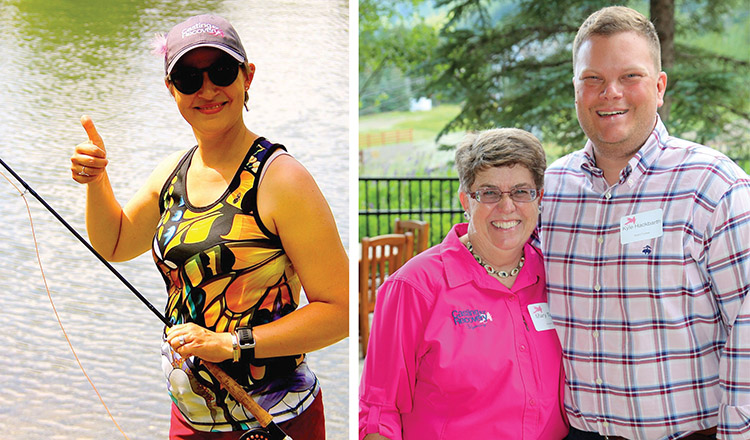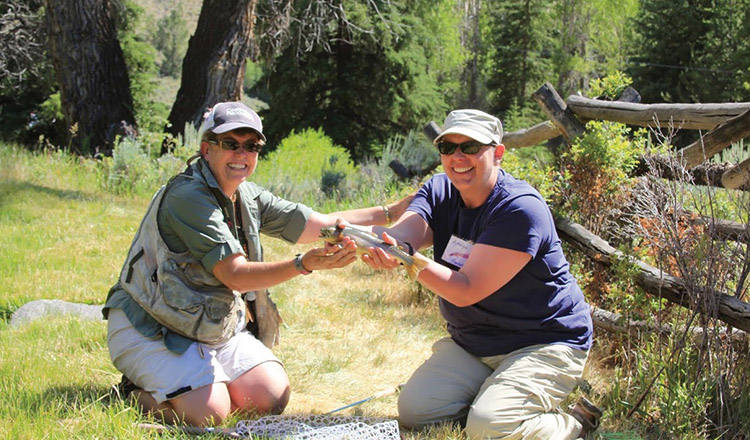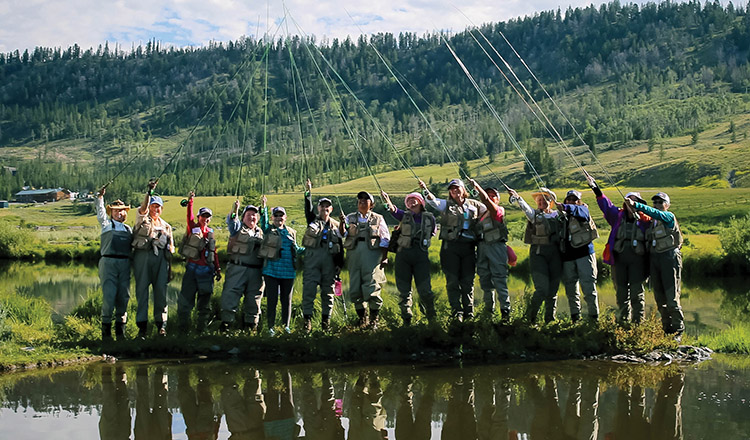What could be more renewing than a few days at a lakeside cabin in the Blue Ridge Mountains, part of it spent fly fishing? “It was a peaceful setting,” Ann Camden (A’93) says of her April visit to South Carolina’s Oconee State Park. Yet it was so much more.
Diagnosed with stage IV breast cancer, Camden joined a group of 14 women in various stages of the disease for a program developed and offered by the nonprofit Casting for Recovery. As it turned out, they and some 15 volunteer hosts witnessed the full of breadth of nature when a tropical storm hit, an appropriate metaphor for their medical journeys. Storms aside, their days together yielded learning, sharing, strengthening, and new friendships — and yes, fly fishing — with the side benefit of the casting exercise, similar to what’s prescribed after surgery or radiation to promote soft-tissue stretching.
“As many women will tell you, often the most challenging aspects of breast cancer come after treatment is complete, when women are left struggling to find their new normal,” says Whitney Milhoan, executive director of Casting for Recovery. “The medical community now recognizes the importance of treating the whole patient, which includes the psychosocial and emotional impact of the diagnosis, treatment, and survivorship.”
Enter Casting for Recovery and its two-and-a-half-day retreats that combine breast cancer education, peer support, and a therapeutic sport to help participants “experience healing connections with other women and nature.”
When Camden arrived for the program, “It was a little overwhelming because everyone was in different stages of breast cancer and from different backgrounds,” she says. “As people told their stories that first night, it was a huge bonding moment. And we were there to learn to fish, which put a positive spin on things.”

Camden’s participation is one of several Boilermaker connections for Casting for Recovery. A team of students in Krannert’s Executive MBA program recently helped with the organization’s strategic plan through an Active Learning Project. Two Purdue alumni serve on its board of trustees: Mary Turney (MS M’92), board chair and the Wyoming program coordinator, and Kyle Hackbarth (LA’03, MBA’16), who first learned of the nonprofit as one of five on the Krannert team.
“They gave us a blank canvas, and we developed a base strategy and a program they could follow and update yearly,” says Hackbarth, a district sales manager for DuBois Chemicals in Cincinnati, Ohio. Although his selection for the team was by chance, he was drawn to the organization because his mother is a breast-cancer survivor.
The nonprofit appreciated the Purdue program’s contributions. “We were able to absorb this feedback from business professionals, and their diverse perspectives allowed us to identify strengths and weaknesses that had gone previously unnoticed,” Milhoan says. “We were able to take a much more strategic approach to our program development and growth goals.”
Hackbarth joined the group’s board of trustees in January and chairs the strategy committee but admits he doesn’t fly fish. “They look past the fact that I can’t tie.”
Turney’s involvement with the group began in 2008, after her 2005 retirement as president of Telcordia Technologies in Piscataway, New Jersey, and relocation to South Carolina, where she spends winters. A fly fisher, she volunteered for retreats there and in 2011 launched retreats in Wyoming, where she spends summers. “To watch the women transform throughout the retreat is wonderful,” she says. “To see them open up, smile, laugh, and bond with women who have had similar experiences — it’s incredible to see the joy.”

Founded in 1996 by a breast-reconstruction surgeon and a professional fly fisher, Casting for Recovery has provided free retreats for some 8,000 participants over the years. Local programs raise their own funds, recruit volunteers, and create retreats. Nationwide, some 1,600 volunteers embrace the mantra, “To fish is to hope.” This year, 55 Casting for Recovery retreats will be held in 43 states, serving women of all ages in all stages of treatment and recovery. Some international programs are available too, and the group recently launched retreats for military veterans and for those whose cancer has metastasized.
For Camden, the experience brought personal insights and continuing friendships. The senior vice president at G&S Business Communications in Raleigh, North Carolina, and mother of 13-year-old twin daughters says of her retreat, “I didn’t realize how much I needed it until I got there. I was denying the impact that cancer is having on my life and trying to charge ahead. The program helped me reconsider my priorities and the lasting impact on our family.”

